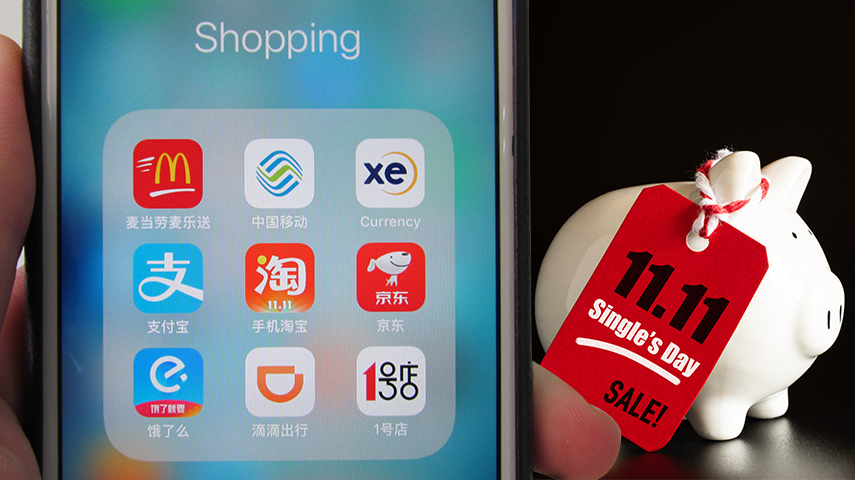- Alibaba reported higher sales on Double 11 of $84.5 billion, while JD.com registered a stronger growth of 28.6%
- The growth of Double 11 sales slowed down, primarily driven by the slowing economy, tech crackdown and the push towards “common prosperity”
- This year’s Double 11 shopping spree had more focus on sustainability and inclusiveness
China’s Double 11 sales, also known as Singles Day sales, one of the biggest online shopping events in the world, witnessed a deceleration in the growth of total gross merchandise volume (GMV) this year. The shopping festival is viewed as a vital barometer of consumer confidence in China. Alibaba and JD.com achieved a record RMB 889 billion ($139.2 billion) in transactions over the 11-day sales period this year, up 15.6% from RMB 770 billion ($114.5 billion) in 2020.
The economic slowdown and stringent regulatory scrutiny on the technology sector had a great impact on Double 11 sales volume. Meanwhile, the Double 11 sales is competing with other shopping festivals throughout the year. This year, Alibaba and JD.com placed more emphasis on sustainability and inclusiveness to align with President Xi Jinping’s calls for “common prosperity” or a more equitable distribution of wealth and Beijing’s climate goals.
Record sales but decelerated growth
Alibaba posted record sales during its 13th Double 11 shopping festival, which spanned 1 to 11 November, with GMV hitting RMB 540.3 billion ($84.5 billion), up 8.5% from a year ago, much slower than the 26% growth rate in 2020. This can be partially attributed to the increasing competition from other platforms. The company highlighted that a record 290,000 brands participated in the event, with sales from 382 brands surpassing RMB 100 million ($15.6 million) by 10 November. The spending by consumers in lower-tier cities and rural areas rose by nearly 25% from 1 to 3 November. Meanwhile, the first one billion orders were delivered to consumers 17 hours faster than last year.

The GMV of JD.com hit RMB 349.1 billion ($54.6 billion), a growth of 28.6% compared with a 32.8% increase last year. This year, the Double 11 Grand Promotion of JD.com started at 8pm on 31 October, compared with midnight on 1 November in the previous years. The company said that 31 brands surpassed RMB 1 billion ($156 million) in GMV during the campaign, and consumers from lower-tier markets accounted for 77% of all consumers. In addition, over 100,000 customers paid using digital RMB on its app over the sales period.
More stringent scrutiny amid tech crackdown and “common prosperity” drive
Apart from the impacts of pandemic-driven supply chain shortages and power disruptions, the crackdown on technology companies by Chinese regulators posed challenges to these e-commerce platforms. In April, Alibaba was fined a record $2.8 billion, as it violated antitrust rules by preventing its merchants from using other e-commerce platforms. China has introduced new laws and regulations relating to antitrust and data protection to deal with unfair competition and protect consumer data and privacy.
This year, Alibaba and JD.com were more cautious in their marketing and promotion campaigns amid stringent scrutiny and the calls by Beijing to promote “common prosperity”, and both platforms did not publish a live GMV tally this year. China’s Ministry of Industry and Information Technology has ordered e-commerce companies including Alibaba, JD.com, Pinduoduo and Meituan to curb marketing spam via text messages during the sales period. Meanwhile, the State Administration of Market Regulation warned e-commerce companies against participating in unfair practices, such as raising prices of items before putting them on sale.
Alibaba has committed RMB100 billion ($15.5 billion) by 2025 to support the common prosperity campaign and added “common prosperity” to its core corporate responsibilities in September. JD.com has prioritised the development of rural areas and established a union to better share wealth with employees. Pinduoduo has pledged to give its entire profit for the June quarter to rural development projects in China.
Focus on sustainability and inclusiveness
Alibaba and JD.com focused more on sustainability and inclusiveness this year to support the promotion of common prosperity and help reduce carbon emissions. China aims to reach peak carbon dioxide emissions before 2030 and achieve carbon neutrality by 2060. “Alibaba Group is turning up the heat on its fight against climate change and has shifted its focus from pure GMV growth to sustainable growth for this year’s 11.11 Global Shopping Festival,” said Chris Tung, chief marketing officer at Alibaba.
Alibaba announced that it will offer RMB100 million ($15.7 million) worth of green vouchers to encourage sustainable consumption during the shopping event. More than 120,000 eco-friendly and energy-efficient home appliances were sold through its platforms over the first nine hours of sales. Its logistics unit Cainiao Network also provided recycling services across more than 60,000 pick-up stations. In addition, Alibaba announced that it will donate RMB 1 ($0.16) for every "Goods for Good” purchase shared on social media by consumers during this year’s shopping event. Furthermore, its Taobao app introduced a “senior mode” to make it more accessible for the elderly, and Tmall launched the “One Shoe Project” to make it easier for people with physical disabilities to buy footwear.
JD.com announced the use of less adhesive tape, paper and plastic for each package that it delivers on 11 November. The company said that it had reduced carbon emissions by 26,000 metric tonnes compared with last year, using new energy vehicles, solar power systems and recyclable packages.




All Comments